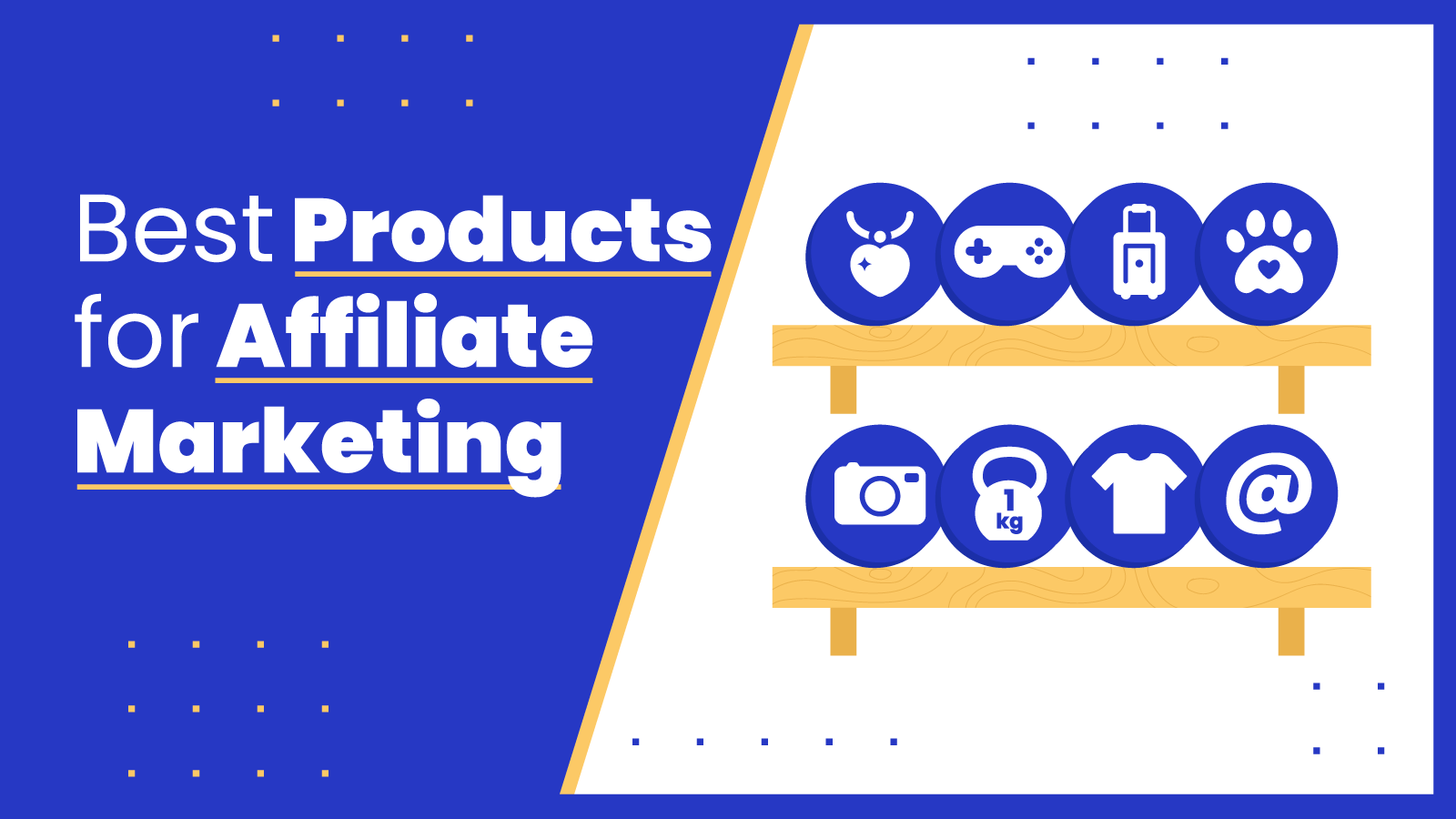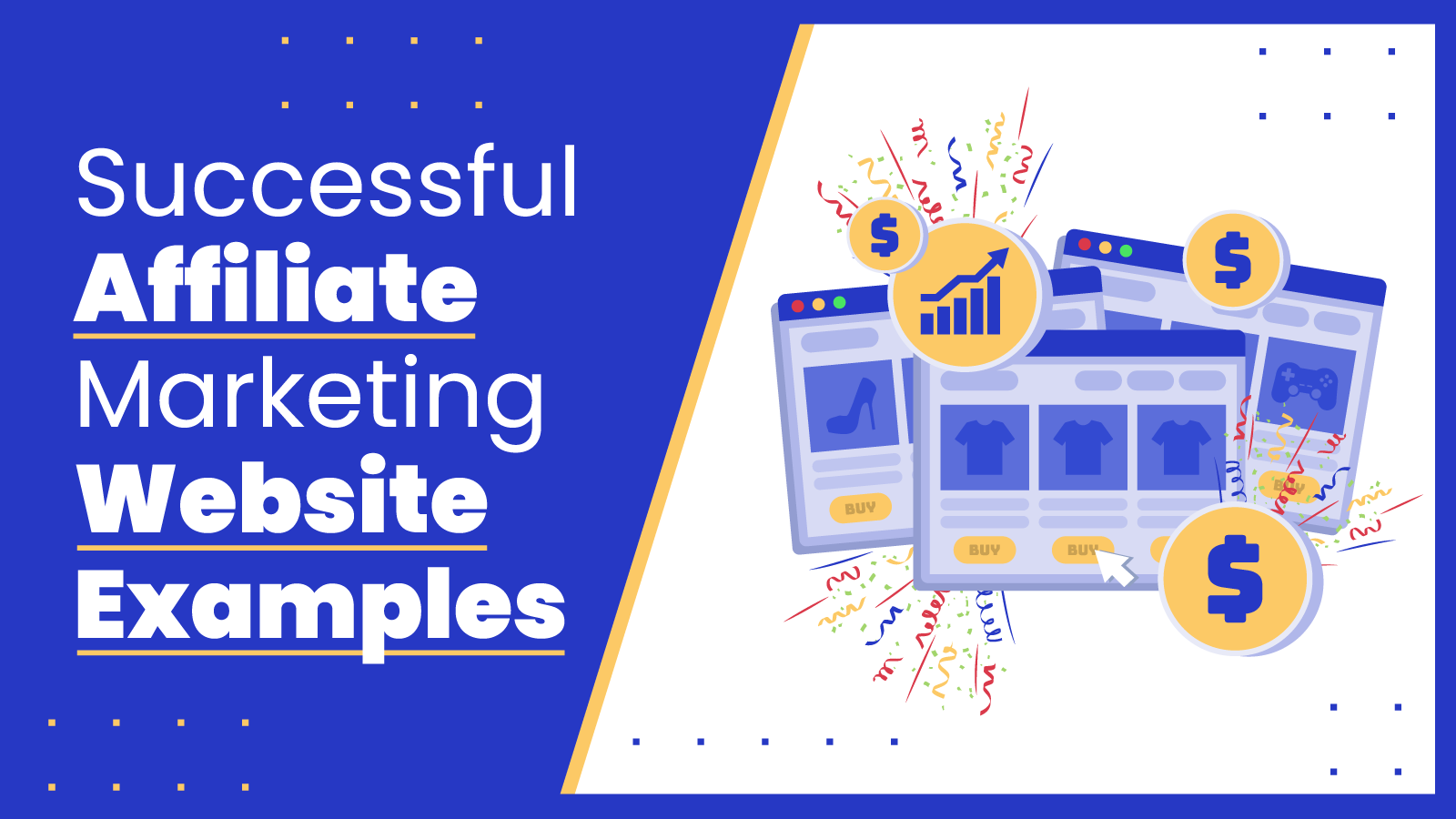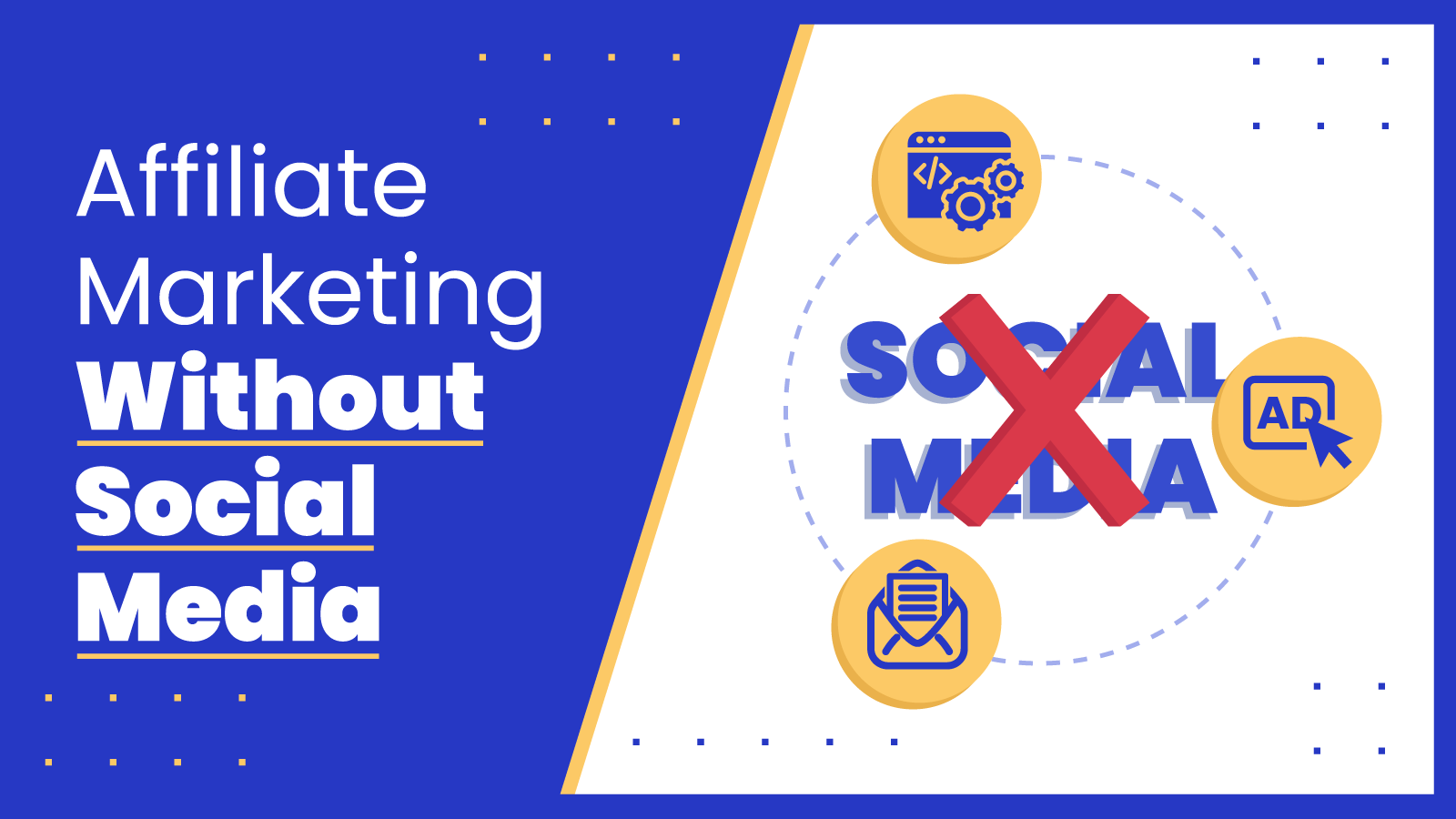If you’re searching for the best affiliate programs for bloggers, you’re likely looking for ways to monetize your blog.
You’re in the right place. Here at Authority Hacker, we’re seasoned blog owners who’ve spent years exploring and honing various monetization strategies. Along the way, we’ve earned valuable commissions promoting dozens of affiliate programs in more niches than we care to remember.
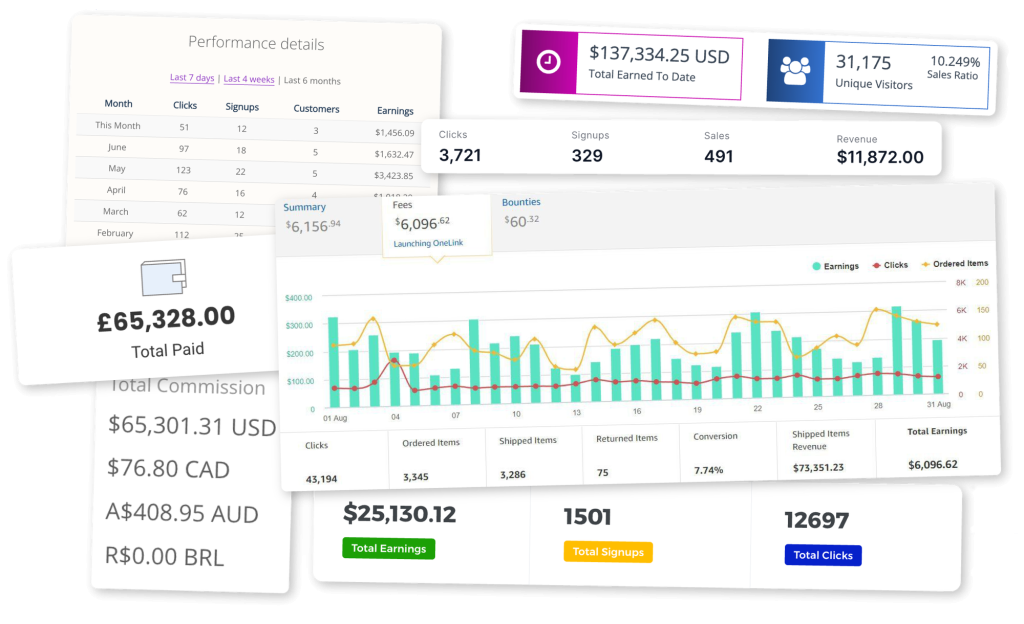
It’s a lucrative industry. In fact, according to our affiliate marketing statistics, the average affiliate marketer earns more than $8,000 per month.
That’s why we’ve listed the essential affiliate programs for bloggers like you — to make it easier to reach (and surpass) that enticing average. These programs can provide solutions to help your audience to start their own blog (if that’s your niche) — think web hosting platforms and email marketing tools — or simply entice them to purchase something great.
Best Affiliate Programs for Bloggers
- Amazon Associates
- Fiverr
- eBay
- ExpressVPN
- Etsy
- ConvertKit
- MailerLite
- Buzzsprout
- Astra
- Cloudways
- OptinMonster
- Authority Hacker
- Namecheap
- Kinsta
- Teachable
- Skillshare
- SiteGround
- FlexJobs
- Notion
- Semrush
- Canva
- FreshBooks
- QuickBooks
- Nordstrom
Join our FREE Training and learn how to:
Find profitable, hidden niches
Steal your competitor’s best keywords
Get links without paying a dime
Build fast sites that rank quickly

1 Amazon Associates
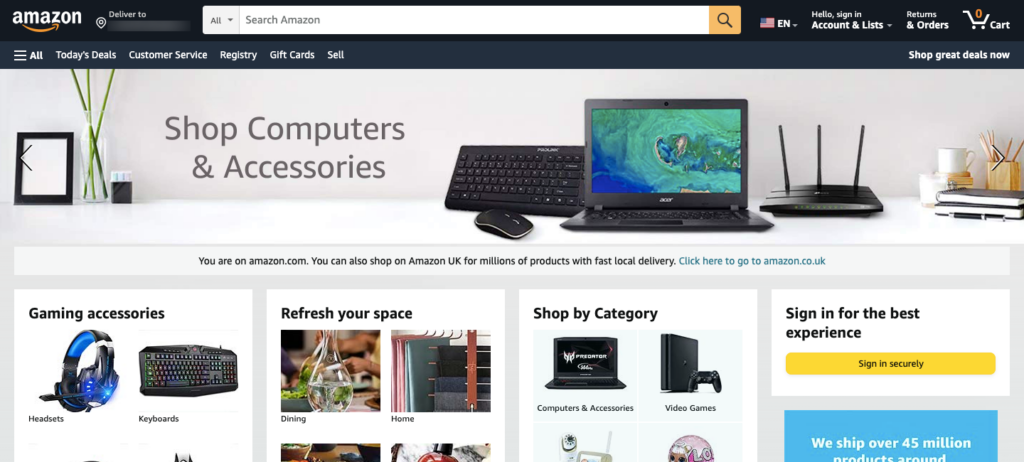
When consumers form relationships with brands, they’re more likely to buy from them. And what are the most significant factors in building those relationships? Trustworthiness and reliability. According to one survey, they’re even more important than convenience and product quality when it comes to winning over shoppers.
Which brings us nicely to Amazon, consistently recognized as one of America’s most trusted ecommerce brands:
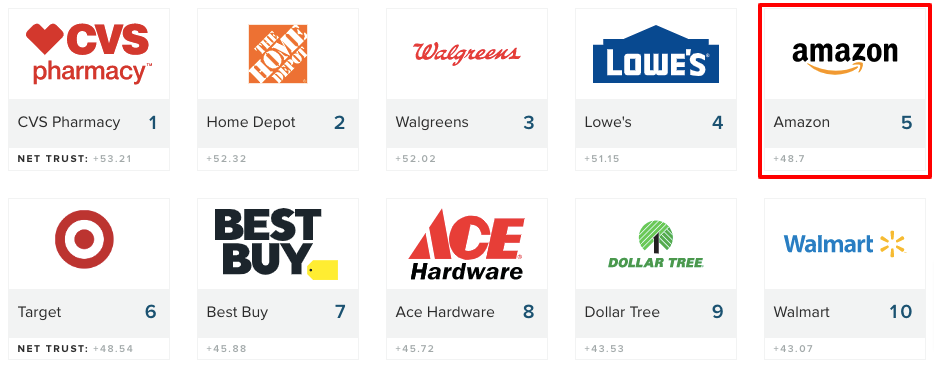
The online marketplace sells tens of millions of products. So it’s a fantastic fit for affiliates in multiple niches (although it works best if you’ve got a B2C audience).
Amazon Associates, Amazon’s affiliate program, pays varying commissions based on your location and the product category you’re promoting. In the US, rates start at a paltry 1% on video games and consoles, but climb as high as 10% on luxury beauty and 20% on Amazon Games.
Find an up-to-date list of Amazon’s US commissions here. And if you’re looking for more information, check out our in-depth guide on How to Become an Amazon Affiliate.
- URL: Amazon Associates affiliate program
- Managed by: In-house
- Commission rate: 1% – 20% per sale
- Cookie duration: 24 hours
- Products/Services sold: Basically everything
- Payment methods: Bank transfer, check, Amazon gift certificate
- Market(s): Global
- Additional resources: Customized linking tools
2 Fiverr

We’re in the midst of a freelance boom, with over 20 million freelancers joined between 2017 and 2022. But this creates a problem for businesses: with so many freelancers out there, how can you find the best ones?
Fiverr — the world’s biggest and best-known marketplace for freelancer services — is the ideal solution. Household names like Google, Meta, and Netflix use the platform to source trusted freelancers across dozens of service areas, including product design, data science, and web development.
Fiverr’s affiliate program offers multiple ways to earn money, from promoting its business management tools to selling Fiverr Learn, the company’s online learning platform.
However, the simplest solution for most affiliates is to sell freelance services, known as gigs. Affiliate sales pay $15 – $150 per gig. Or choose Fiverr’s hybrid model to earn recurring income worth 10% of the contract value for 12 months, plus a $10 bounty payment.
There’s just one small catch: Fiverr only pays commissions on sales to first-timer customers. So don’t expect any repeat sales here. For more tips, tricks, and insights, check out our Fiverr affiliate program review.
- URL: Fiverr affiliate program
- Managed by: In-house
- Commission rate: Various
- Cookie duration: 30 days
- Products/Services sold: Freelance services, online learning, business management tools, collaboration tools
- Payment methods: PayPal, Payoneer, wire transfer
- Market(s): Global
- Additional resources: Custom link generator, banners, gifs, video banners, gig ad and search box widgets, prewritten ebooks and emails
3 eBay
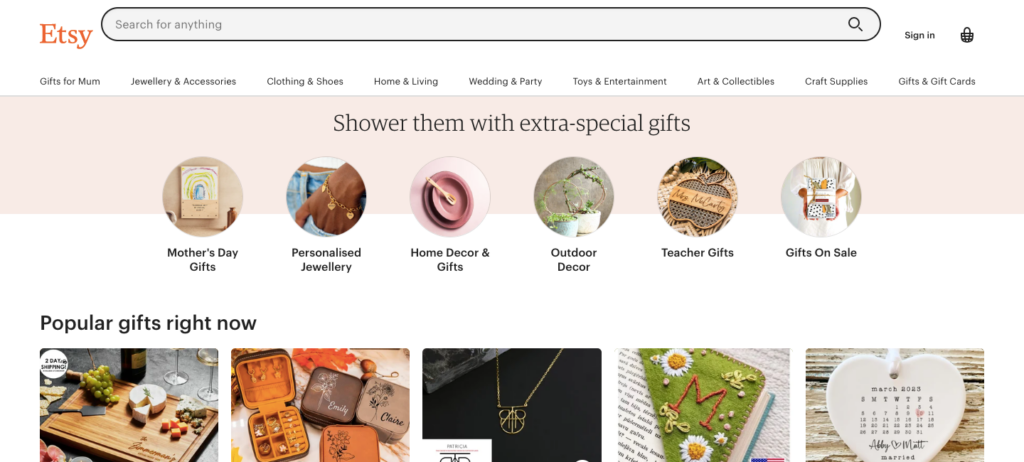
With 138 million active buyers worldwide, eBay provides excellent potential for B2C affiliates, even alongside major players like Amazon Associates.
Wondering why to choose eBay over Amazon? Here’s why: Bloggers thrive in niche markets, and so does eBay. For example, it pays 3% on food and alcohol sales, while Amazon only offers 1% on groceries and zero on booze.
Check out eBay’s rate card here and compare it to Amazon’s to see which makes most sense for you (but be aware that all commission rates are subject to change). And read our eBay affiliate program review for a deeper dive into the ins and outs of the eBay Partner Network.
- URL: eBay Partner Network affiliate program
- Managed by: In-house
- Commission rate: 1% – 4% per sale
- Cookie duration: 24 hours
- Products/Services sold: Fashion, electronics, garden & DIY products, health & beauty, and more
- Payment methods: PayPal, bank transfer
- Market(s): Various
- Additional resources: Custom graphics & banner ads, branded creatives & logos, deals & events, reporting tools
4 ExpressVPN
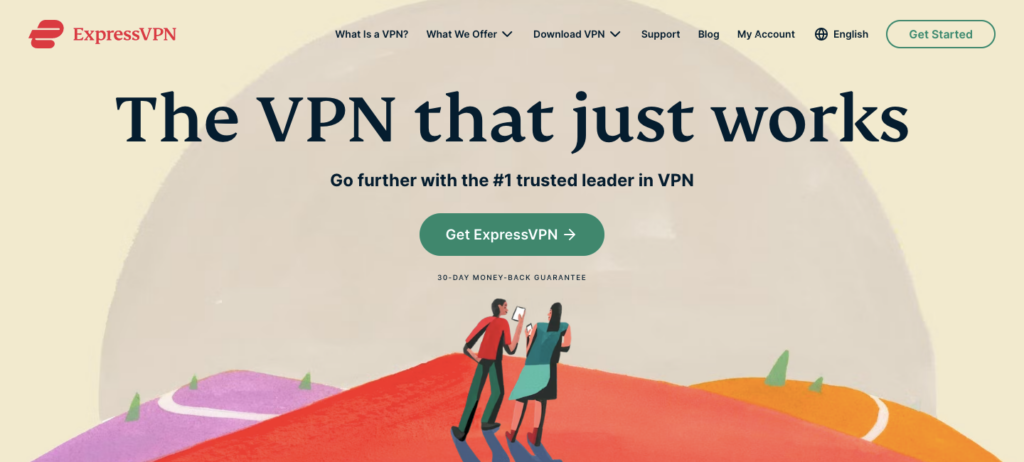
Privacy matters to online users and 40% of Americans are concerned about their data. That’s music to the (metaphorical) ears of the VPN industry, set to hit $76 billion by 2027.
One of the market’s biggest players is ExpressVPN, with four million active subscribers. And according to our research, it’s also one of the most popular VPN affiliate programs.
You’ve likely seen ExpressVPN on YouTube thanks to high-profile sponsorships with 1,500+ YouTubers. This impressive brand recognition simplifies selling for bloggers.
As an affiliate marketer, you can join ExpressVPN’s program through multiple networks, with FlexOffers currently paying the highest commissions.
| Network | Commission | Cookie Duration | Market | URL |
| CJ Affiliate | Up to $36 | 90 days | Global | Sign Up |
| Skimlinks | Up to $54 | Unlisted | Global | Sign Up |
| FlexOffers | Up to $73.60 | 90 days | Global | Sign Up |
| Rakuten | Up to $50 | 90 days | Global | Sign Up |
| Impact | Up to $36 | Unlisted | Global | Sign Up |
- Products/Services sold: VPN services
- Additional resources: Dedicated account managers, marketing materials, specialized landing pages, affiliate newsletter, optimization advice
5 Etsy

Vintage has never been more popular, with 60% of Americans regularly buying vintage items.
For many of those shoppers, Etsy is the obvious go-to platform. It specializes in vintage, handmade, and custom goods — from clothing and shoes to interior decor. Its active buyers also tripled from 2017 to 2021, hitting $2 billion in yearly revenue.
Etsy’s affiliate program is managed by Awin, offering a 4% commission per sale. That’s competitive with Amazon and eBay. But Etsy outshines with a far longer 30-day cookie window.
For bloggers with an impressive social media presence, consider Etsy’s creator program too.
- URL: Etsy affiliate program
- Managed by: Awin
- Commission rate: 4% per sale
- Cookie duration: 30 days
- Products/Services sold: Handmade items and vintage products
- Payment methods: SEPA, BACS, ACH, domestic payments, international wire transfer
- Market(s): Various
- Additional resources: Native ads
6 ConvertKit
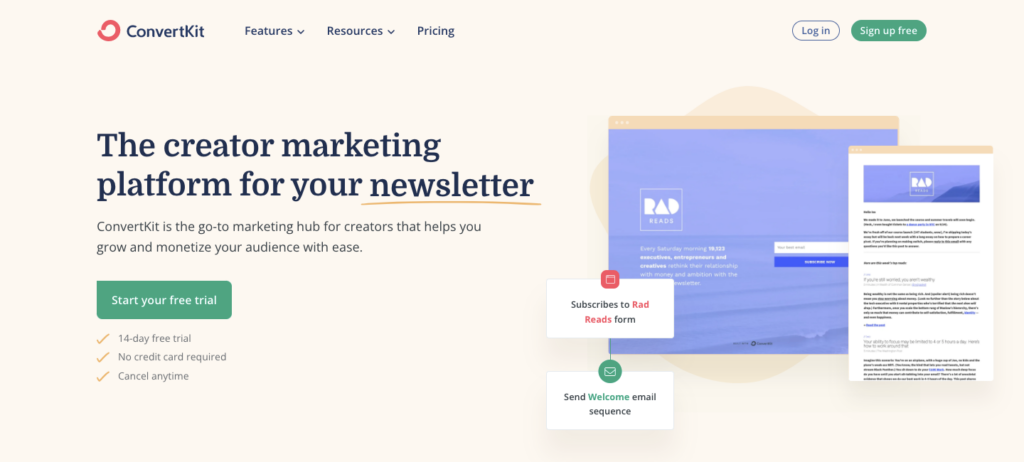
If you promote your blog through a newsletter, you’ll already know about the power of email marketing, which delivers an estimated return of $36 for every $1 spent.
However, the vast majority of email marketing tools are aimed at businesses. What if your readers are content creators who want to leverage email to reach and engage their audiences?
That’s where ConvertKit comes in. It provides email marketing tools and resources designed with coaches, authors, podcasters, and musicians in mind, including eye-catching landing pages and beautiful email templates to help creators showcase their best work. The platform claims to have a 99.8% delivery rate, giving users the best possible chance of avoiding the spam folder.
ConvertKit runs one of the highest-paying affiliate programs for bloggers, offering recurring commissions of 30% for up to 24 months. With the platform’s standard Creator plan priced from $9 per month, you could earn $86+ from a single sale.
- URL: ConvertKit affiliate program
- Managed by: LinkMink
- Commission rate: 30% recurring commission for up to 24 months
- Cookie duration: 60 days
- Products/Services sold: Email marketing software
- Payment methods: Unlisted
- Market(s): Global
- Additional resources: Graphics, video assets, webinars, affiliate dashboard
7 MailerLite
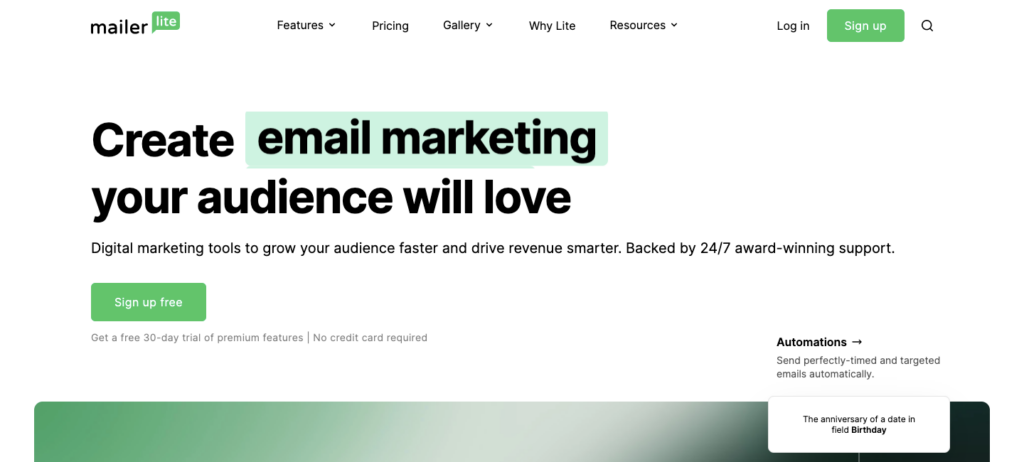
Of course, content creators aren’t the only people using email marketing. If you’re looking to recommend email tools to a more business-y audience, you’re better off promoting a more generalist option like MailerLite.
The platform prides itself on delivering superb customer support, with its average live chat response time of five minutes and a 97% satisfaction rate.
MailerLite integrates with major ecommerce platforms like Shopify and WooCommerce. So if your audience includes a lot of retail brands and direct-to-consumer merchants, this affiliate program feels like a good fit.
Like ConvertKit, MailerLite offers attractive affiliate partner terms, paying 30% recurring commissions for as long as your referrals keep using the platform. So a single sale could secure you a lifelong passive income stream.
There’s much to like here, but if we had to be critical, the 30-day cookie length is a little short by the standards of the email marketing industry, where 365-day windows aren’t unheard of.
- URL: MailerLite affiliate program
- Managed by: In-house
- Commission rate: 30% recurring lifetime commissions
- Cookie duration: 30 days
- Products/Services sold: Email marketing software, website and landing page tools
- Payment methods: PayPal
- Market(s): Global
- Additional resources: Branding and marketing assets, dedicated partner support, custom partner dashboard
8 Buzzsprout
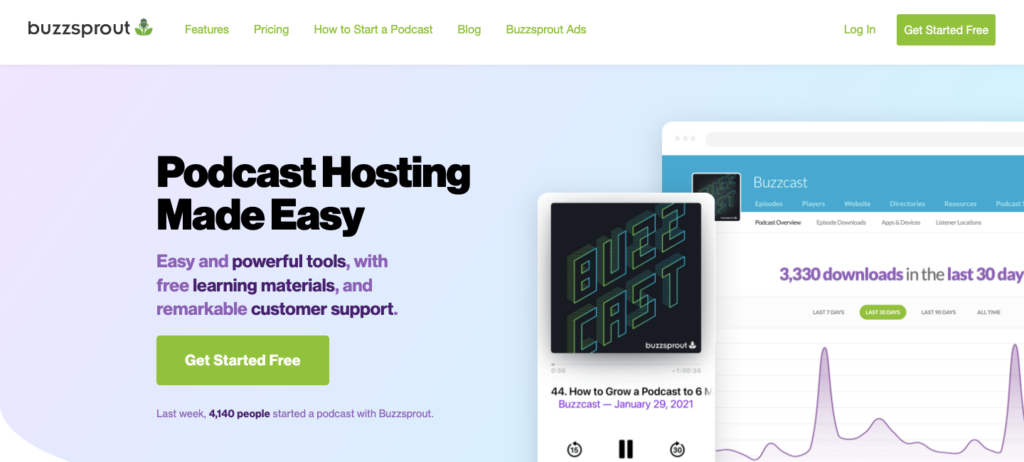
It’s hard to explain the appeal of podcasts. But there’s no denying their popularity, with about half of Americans tuning in last year, and one-fifth listening almost daily.
Enter Buzzsprout, a podcast hosting platform that offers vital tools for launching a podcast. It also helps podcasters reach major directories like Apple, Spotify, and Amazon Music.
Around 4,000 people join Buzzsprout to start a podcast weekly, so it’s clearly in-demand.
Buzzsprout’s affiliate program pays a flat $20 commission for every sale you generate. Unusually, it also offers a $20 credit to the person you refer, which should help your conversion rate. Best of all, it has a lifetime cookie window — so even if a customer takes five years to buy after clicking your unique referral link, you still earn a commission.
- URL: Buzzsprout affiliate program
- Managed by: In-house
- Commission rate: $20 per sale
- Cookie duration: Lifetime
- Products/Services sold: Podcasting tools
- Payment methods: PayPal
- Market(s): Global
- Additional resources: Deep linking
9 Astra
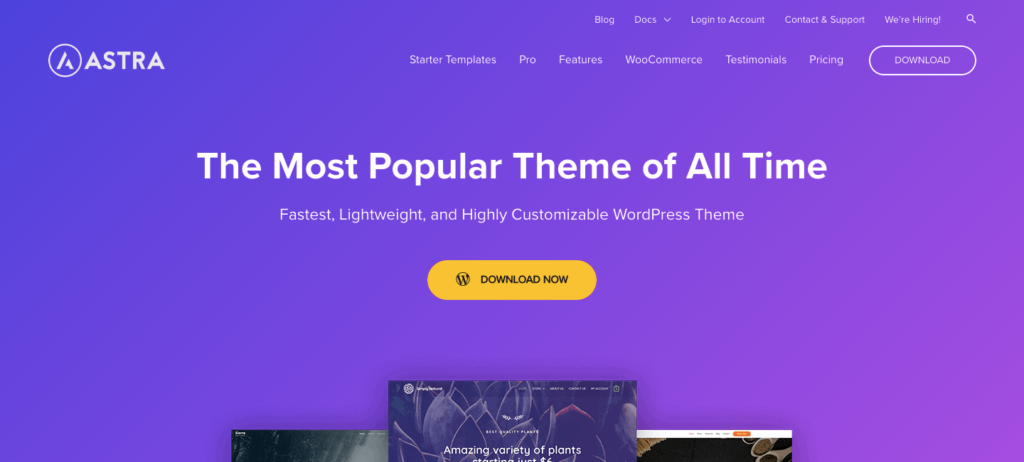
Bafflingly, over one-quarter of small businesses still don’t have a website. That’s good news for Astra, which sells the world’s most popular WordPress theme, used by 2.3+ million websites.
Part of its success is down to speed. The Astra theme takes up less than 50 kb of space (compared to 300 kb or more for many themes), helping it load super-fast. That’s a major selling point, given that over half of internet users expect pages to load in three seconds or less.
If your audience is interested in building a website and you want to earn passive income consistently, Astra’s affiliate program is a fantastic fit. It pays 30% recurring commissions, equivalent to up to $375 per sale, with leading Astra affiliates earning $5,000+ monthly.
- URL: Astra affiliate program
- Managed by: In-house
- Commission rate: 30% per sale
- Cookie duration: 60 days
- Products/Services sold: WordPress theme, website templates
- Payment methods: PayPal
- Market(s): Global
- Additional resources: Images and banners, social media posts, email copy, videos, blog ideas, dedicated affiliate manager
10 Cloudways
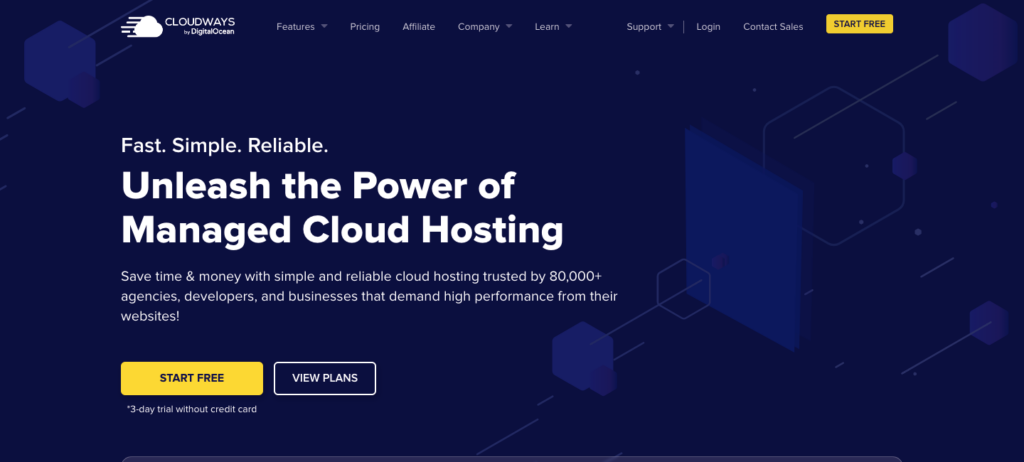
The website hosting market is expected to be worth over $267 billion by 2028. And while Cloudways might not be the biggest player in the niche, it is one of the most highly rated for excellent customer service.
Given its comparatively high pricing, Cloudways isn’t an obvious fit for hobbyists who just want to start a blog. But it’s an excellent match for small businesses, with G2 naming it the #1 hosting provider for SMBs. So if you write about topics like business advice and entrepreneurship, this affiliate program is a strong choice.
The Cloudways affiliate program has two earning models: Slab (up to $125 per sale) and Hybrid ($30 upfront payment and lifetime 7% recurring commissions). Unless you’re driving 50+ sales monthly, Hybrid delivers the best income potential for most bloggers.
- URL: Cloudways affiliate program
- Managed by: In-house
- Commission rate: Up to $125, or $30 per sale + 7% lifetime commission
- Cookie duration: 90 days
- Products/Services sold: Cloud hosting
- Payment methods: Unlisted
- Market(s): Global
- Additional resources: Dedicated affiliate support, promotional banners, exclusive deals, seasonal campaigns, landing pages
11 OptinMonster
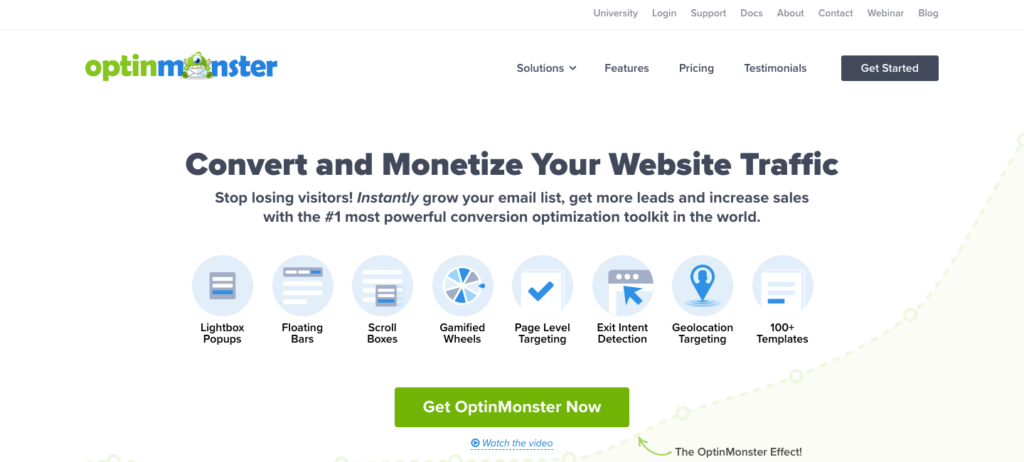
Nine in 10 marketers cite “lead generation” as their #1 marketing goal, while 37% say generating quality leads is one of the biggest challenges.
That’s fantastic news for businesses like OptinMonster, a powerful lead-generation solution for bloggers, e-commerce stores, and businesses. It has 1.2+ million users, including heavyweights like McAfee, Pinterest, and Tripadvisor.
OptinMonster’s affiliate program pays 20% per sale, meaning you could earn up to $118 from a single conversion. And it boasts superb conversion rates of 12.7%. This means about one in eight people who click through become customers. So there’s a high chance your referrals will convert — resulting in more commissions.
And when it comes to closing the deal, be sure to mention the 14-day, no-quibble money-back guarantee.
- URL: OptinMonster affiliate program
- Managed by: ShareASale
- Commission rate: 20% per sale
- Cookie duration: 45 days
- Products/Services sold: Lead generation software
- Payment methods: Check, direct deposit, international direct deposit, wire transfer, Payoneer
- Market(s): Global
- Additional resources: Banner ads, coupons and deals, affiliate marketing tips
12 Authority Hacker

Authority Hacker… Where have I heard that name before?
The fact you’re reading this article means you’re at least somewhat aware of the benefits of affiliate marketing. And you might also be aware that it takes a lot of work to make it as an affiliate marketer.
That’s basically why Authority Hacker exists.
Mark and Gael (the two handsome devils in the above screenshot) spent years building successful affiliate websites in dozens of niches. They made a bunch of mistakes along the way — and they got a lot of stuff right, too. Today, they share their learnings and growth strategies with students through our flagship affiliate marketing courses, The Authority Site System and Authority Hacker Pro.
If you send customers our way, we reward you with commissions of up to $1,979 per sale, making this one of the highest-paying affiliate programs in any niche. You also get a 60-day cookie window to give your traffic the best chance of converting.
Our top affiliates achieve EPCs of $10+, so there’s some serious earning potential here. But we don’t work with just anyone. Check out our affiliate page to see if we’re a good match.
- URL: AuthorityHacker affiliate program
- Managed by: ThriveCart
- Commission rate: Up to $1,979 per sale
- Cookie duration: 60 days
- Products/Services sold: Affiliate marketing training
- Payment methods: PayPal
- Market(s): Global
- Additional resources: Shared webinars and joint promotions, retargeting ads, high-quality educational resources (blogs and podcast episodes)
13 Namecheap
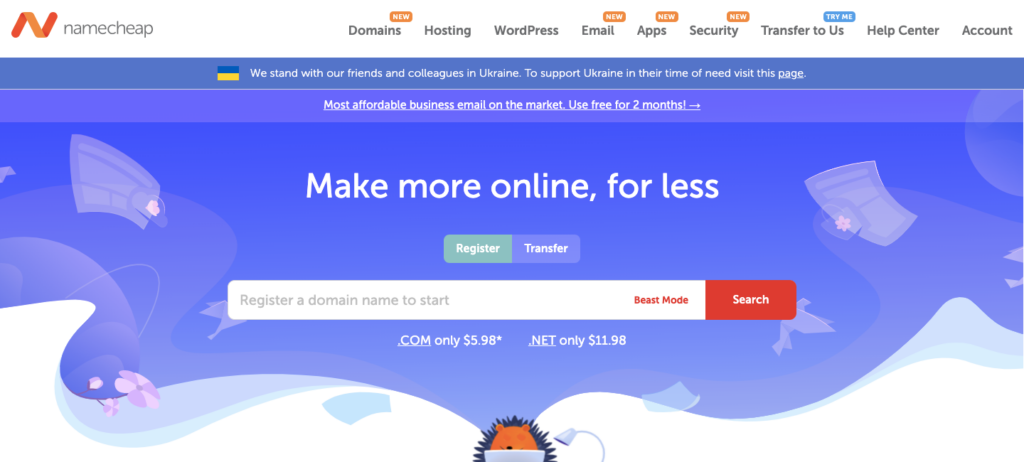
We’ve already noted that a staggering number of businesses still haven’t built a website. And what’s the first step toward building a site? Registering a domain name.
That’s where Namecheap comes in. It helps customers register their own domain, find the right hosting, add professional email, and enhance site appearance through web and logo design tools. In other words, everything you need to kickstart a website.
While there are tons of companies out there offering similar services, Namecheap comes highly recommended, with a 4.7 rating on Shopper Approved from over two million customer reviews. It’s even used by big brands like Figma and Imgur.
You can find the company’s affiliate program on various networks, with the most attractive terms currently available through Impact.
| Network | Commission | Cookie Duration | Market | URL |
| Impact | 20% – 50% | 30 days | Global | Sign Up |
| ShareASale | 30% | 30 days | Global | Sign Up |
| CJ Affiliate | Up to 35% | 30 days | Global | Sign Up |
- Products/Services sold: Domain name registration, web hosting
- Additional resources: Banners, text links, referral offers, dedicated support team
14 Kinsta
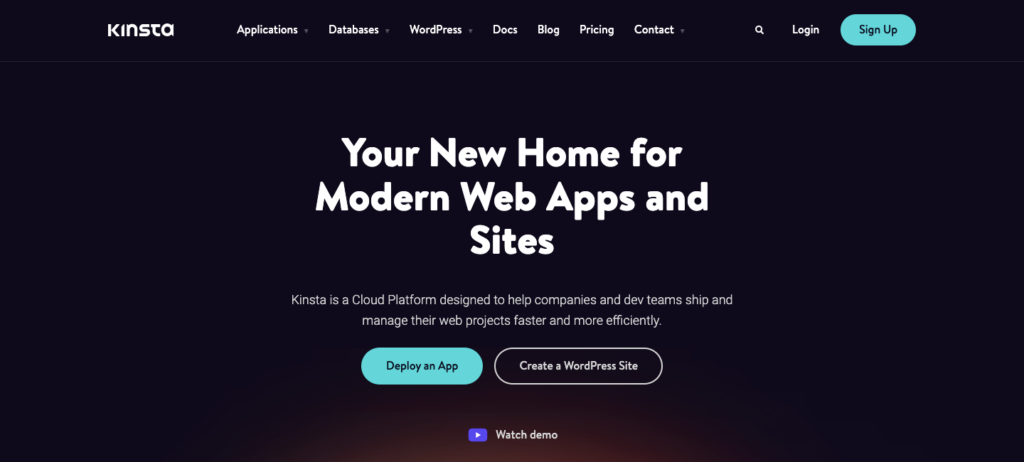
Another of the big hosting providers, Kinsta is trusted by over 55,000 developers and 25,000+ businesses, including Hootsuite and Tripadvisor.
The company is clearly proud of its customer service, touting technical support response times as low as 1 minute 27 seconds, and boasting a satisfaction rate of 97%. It’s also highly rated on Trustpilot, giving you the confidence that you’re recommending a quality service.
Kinsta’s affiliate program pays out $1 million in yearly commissions and has three different referral models: WordPress hosting, app hosting, and database hosting. All pay recurring commissions, offering the chance to build a long-lasting revenue stream from each referral.
Pleasingly, Kinsta also boasts a super low 2% churn rate, so there’s a good chance your referrals will keep paying — which means you keep earning. It also has a longer cookie duration than many web hosting affiliate programs.
- URL: Kinsta affiliate program
- Managed by: In-house
- Commission rate: 5% – 10% per sale (plus possible bounty payments)
- Cookie duration: 60 days
- Products/Services sold: Managed cloud hosting platform
- Payment methods: PayPal
- Market(s): Global
- Additional resources: In-depth guides, banners, dedicated affiliate support, custom link generator, multilingual dashboard
15 Teachable
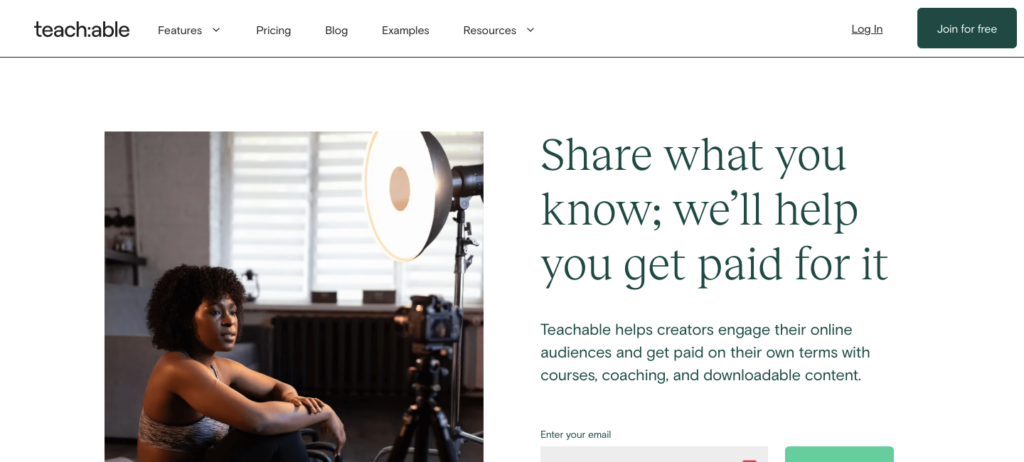
We humans are on a constant quest for self-improvement, as demonstrated by the fact that learning a new skill is consistently named one of America’s top new year’s resolutions.
That’s why online learning platforms like Teachable have become a consistent earner for many affiliate marketers.
Teachable helps creators build and promote online courses, digital downloads, and coaching content without any coding knowledge. And, unlike some similar platforms, creators retain full control over their course materials.
With Teachable’s affiliate program, you earn 30% of each plan purchased by creators you refer to the platform. So if they choose a recurring price plan, you receive recurring commissions, helping you build a regular stream of affiliate income. The average Teachable affiliate partner earns $450 monthly, while top performers are pocketing $1,000+ per month.
- URL: Teachable affiliate program
- Managed by: Impact
- Commission rate: 30% per sale
- Cookie duration: 30 days
- Products/Services sold: Tools for education creators
- Payment methods: PayPal, check, wire transfer, direct deposit, ACH transfer
- Market(s): Global
- Additional resources: Unique promo codes, deep product linking,
16 Skillshare

If you think of Teachable as a B2B online learning affiliate program, Skillshare is its B2C equivalent: you’re promoting the service to learners rather than course creators. So if you write about topics like self-improvement and career advice, this program is a natural fit.
Skillshare offers over 34,000 classes across dozens of creative niches, from digital illustration to creative writing to UX design. So there’s a good chance you’ll find a skill or course that’s relevant to your audience.
It even offers a bunch of free courses and a seven-day free trial, so would-be customers can try it out before committing. That should make it easier to close the deal.
Skillshare’s affiliate program pays 40% per sale, equivalent to up to $67 for each customer you refer. However, despite the comparably high commission rate, the platform actually has a lower EPC than Teachable, at $0.47 (vs. $1.11).
- URL: Skillshare affiliate program
- Managed by: Impact
- Commission rate: 40% per sale
- Cookie duration: 30 days
- Products/Services sold: Online learning
- Payment methods: PayPal, check, wire transfer, direct deposit, ACH transfer
- Market(s): Various
- Additional resources: Unique promo codes, deep product linking, product catalog
17 SiteGround
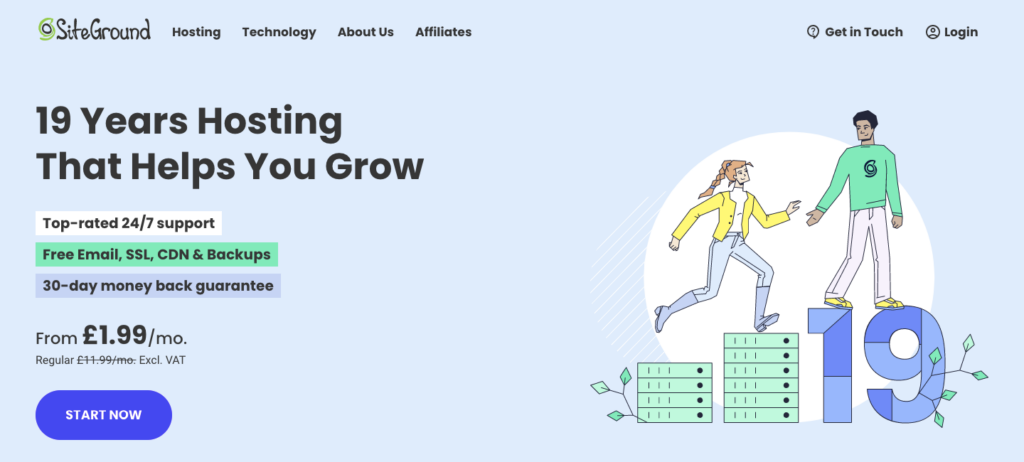
We’ve made no secret of the fact that we <3 SiteGround, even naming it as our #1 hosting provider for beginners.
It’s cheap, fast, and reliable, as demonstrated by its 98% satisfaction rating. And it’s also extremely popular, with figures from W3Techs revealing that SiteGround hosts over 2% of all websites.
(Find out what else we love about the hosting provider in our SiteGround affiliate program review.)
SiteGround’s affiliate program pays commissions of up to $100 per sale and has a solid 60-day cookie window, giving plenty of time for your referrals to convert. However, you need to drive 11+ sales per month to hit the top-tier commission rate; you start at a less impressive (but still respectable) $50 per sale.
- URL: Siteground affiliate program
- Managed by: In-house
- Commission rate: Up to $100 per sale
- Cookie duration: 60 days
- Products/Services sold: Web hosting
- Payment methods: PayPal, wire transfer
- Market(s): Global
- Additional resources: Banners, screenshots, custom landing pages, detailed performance tracking, dev tools
18 FlexJobs

It’s fair to say the world has embraced flexible working. According to McKinsey & Company, it’s one of the top three motivators for Americans looking for a new job, only behind better pay or hours and better career opportunities.
For many jobseekers, FlexJobs has become the go-to portal for flexible roles, with every opportunity on the site offering some degree of flexibility — such as freelancing, working from home, and part-time hours. It features jobs across 50+ career categories and is used by several high-profile employers, including Apple, Salesforce, and United Healthcare.
On the face of things, the FlexJobs affiliate program looks pretty… meh. It pays $7 per membership sale, rising to $10 if you refer 50+ sales per month. And it only has a one-day cookie window, which sucks.
Still, CJ Affiliate shows a three-month EPC of $8.55, so there’s clearly decent earning potential here.
Note: At time of writing, FlexJobs isn’t reviewing applications from outside the US. This will presumably change at some point, so check their listing on CJ Affiliate before applying.
- URL: FlexJobs affiliate program
- Managed by: CJ Affiliate
- Commission rate: Up to $10 per sale
- Cookie duration: 1 day
- Products/Services sold: Employment services
- Payment methods: Check, direct deposit, Payoneer
- Market(s): Various
- Additional resources: Promotions and discounts, affiliate newsletter, dedicated affiliate manager
19 Notion
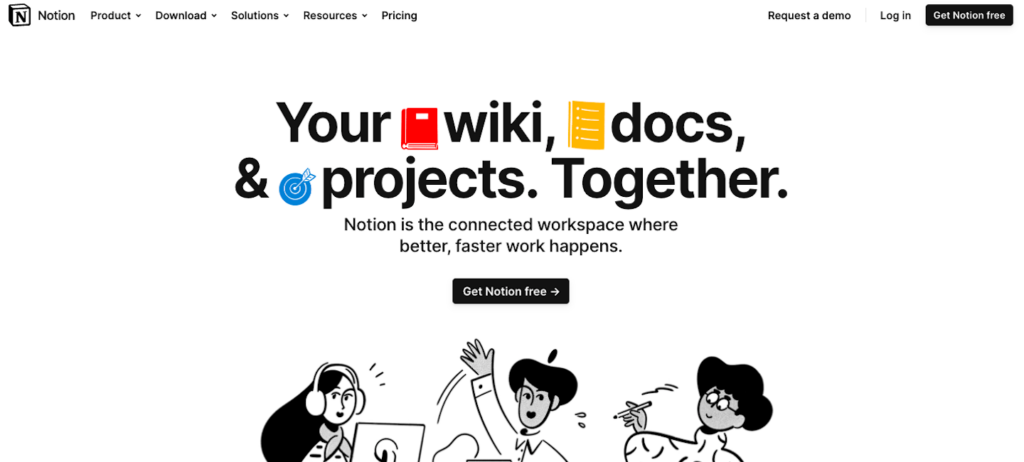
The global market for productivity software will be worth an estimated $88 billion by 2028, so it’s well worth considering as an affiliate niche (provided you have a B2B audience).
One of the current belles of the productivity tool ball is Notion, an all-in-one platform combining documents, note-taking, task management, and collaboration. Unlike a lot of similar tools, it’s actually good. So good, in fact, that we use it here at Authority Hacker for all our content planning needs.
It even has some jazzy AI functionality, allowing you to rewrite chunks of text or generate copy from scratch. So it’s kind of like ChatGPT plus Trello plus Asana plus Google Docs.
If you’re looking for high-paying affiliate programs, Notion is a solid choice. It offers recurring commissions of up to 50% per sale for the first 12 months of the customer’s subscription, so a single sale could translate to hundreds (or even thousands) of dollars in commissions.
- URL: Notion affiliate program
- Managed by: PartnerStack
- Commission rate: 50% per sale
- Cookie duration: 90 days
- Products/Services sold: Productivity and collaboration tools
- Payment methods: PayPal, Stripe
- Market(s): Global
- Additional resources: Best practices, guides, videos
20 Semrush
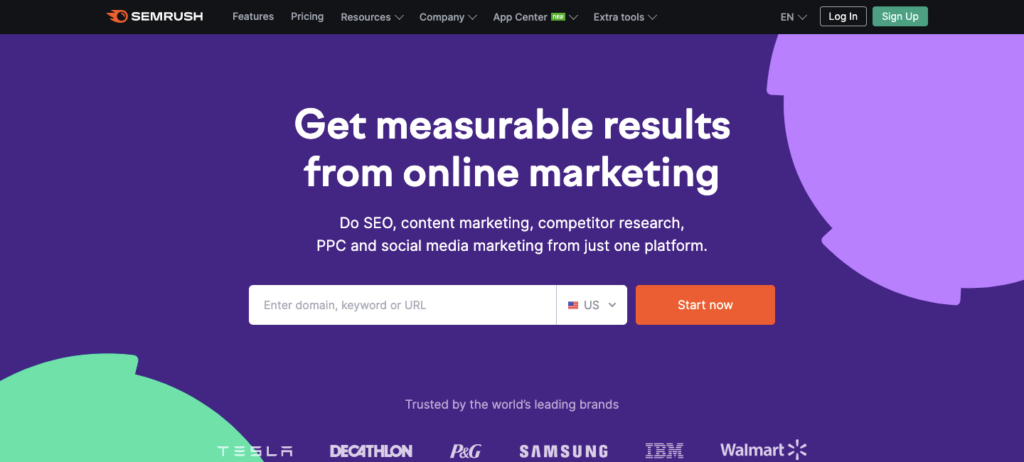
If you’ve ever worked in digital marketing, you’re probably familiar with Semrush, an SEO and content marketing platform that combines 40+ tools, covering everything from keyword research to competitor analysis.
At first glance, Semrush looks pretty expensive, with pricing starting at ~$100 per month. But don’t let that put you off, because it’s a lot cheaper than subscribing to a bunch of standalone SEO tools that offer a fraction of Semrush’s functionality.
Either way, the price point clearly isn’t putting off customers, because over seven million marketers use the platform — including one in four Fortune 500s.
Semrush regularly appears on lists of popular affiliate programs because it offers commissions for free trials. That’s right: you earn $10 per referral, even if the customer never pays Semrush a cent. Unsurprisingly, you’ll earn a lot more if your referrals choose a paid Semrush; $200 per sale, to be precise.
- URL: Semrush affiliate program
- Managed by: Impact
- Commission rate: Up to $200 per sale
- Cookie duration: Up to 400 days
- Products/Services sold: Digital marketing tools
- Payment methods: PayPal, check, wire transfer, direct deposit, ACH transfer
- Market(s): Various
- Additional resources: Unique promo codes, deep product linking, product catalog, exclusive creatives, experienced account managers
21 Canva
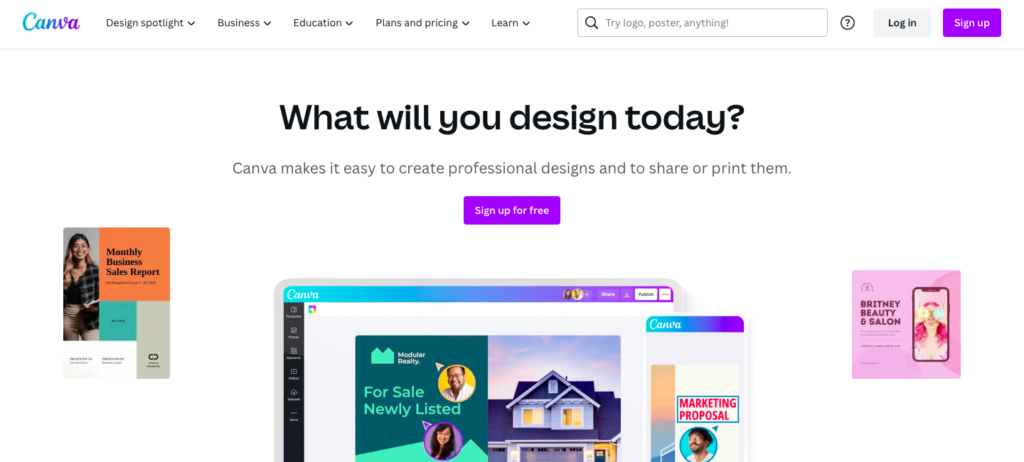
Need to design a social media banner, a slick company presentation, or a wedding invitation? Don’t have an InDesign license? Chances are you’ll head straight to Canva, which is fast becoming the world’s favorite graphic design tool. Over 100 million monthly active users log on to Canva to bring their ideas to life.
In part, the platform’s immense popularity stems from its simplicity. With thousands of templates and millions of photos, graphics, videos, fonts, and audio files available, it’s (relatively) easy for non-designers to create beautiful assets, fast.
Unsurprisingly, the vast majority of Canva users choose the platform’s free product tier. Your task as an affiliate partner is to promote its paid packages. For each sale you refer, you’ll pocket up to $36.
- URL: Canva affiliate program
- Managed by: Impact
- Commission rate: Up to $36 per sale
- Cookie duration: 30 days
- Products/Services sold: Graphic design software
- Payment methods: PayPal, bank transfer
- Market(s): Global
- Additional resources: Email and live chat support, ad templates
22 FreshBooks

Serving customers; dealing with suppliers; planning for the future; small business owners are busy people. The last thing they want is to spend days on end sending invoices.
So they turn to FreshBooks, an accounting and invoicing platform built with small businesses in mind. It claims to help users save up to 553 hours and $7,000 in billable time a year on repetitive paperwork. It’s no surprise then that over 30 million businesses have used FreshBooks.
Like Semrush, FreshBooks is one of those rare affiliate programs that pays for free trial signups; for each trial you refer, you’ll earn up to $10. And if those trialists become paying customers, you’ll be rewarded with upgrade commissions of up to $200.
Best of all, the program has a 120-day cookie window, leaving plenty of time for trialists to explore the platform and sign up for a paid account.
- URL: FreshBooks affiliate program
- Managed by: ShareASale
- Commission rate: Up to $200 per sale
- Cookie duration: 120 days
- Products/Services sold: Accounting & invoicing software
- Payment methods: Check, direct deposit, international direct deposit, wire transfer, Payoneer
- Market(s): Global
- Additional resources: Creative assets, coupons and deals, affiliate marketing newsletters, dedicated affiliate team, article ideas, social media tips & strategies, email & newsletter ideas, performance tracking & insights
23 QuickBooks
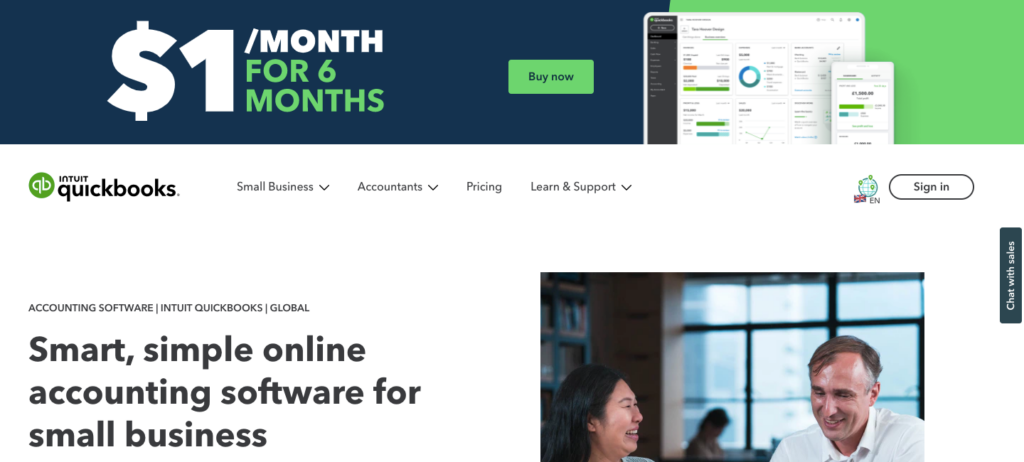
QuickBooks is the yin to FreshBooks’ yang; another accounting platform designed to save small business owners a bunch of time and stress on dull-but-essential tasks. More than 4.5 million customers globally use QuickBooks, giving the platform superb brand awareness (making for a comparatively easy “sell”).
Joining the QuickBooks affiliate program is kind of like joining two separate programs, because you’ve got two distinct products to promote: QuickBooks Pro and QuickBooks Payroll. The former is the most popular accounting software in the US, while the latter is a low-cost payroll service used by over one million businesses.
Commissions are fractionally higher for sales of QuickBooks Payroll, at up to $55 per sale (vs. up to $50 per sale for QuickBooks Pro).
Figures from CJ Affiliate, QuickBooks’ affiliate network, show a three-month EPC of $190.51 — the second-highest in the network’s productivity tools category. That’s impressive, but it’s lower than FreshBooks’ 30-day EPC of $247.47 (albeit they’re on different affiliate networks, so the figures aren’t totally comparable).
- URL: QuickBooks affiliate program
- Managed by: CJ Affiliate
- Commission rate: Up to $55 per sale
- Cookie duration: Up to 45 days
- Products/Services sold: Accounting & payroll software
- Payment methods: Check, direct deposit, international direct deposit, wire transfer, Payoneer
- Market(s): US only
24 Nordstrom
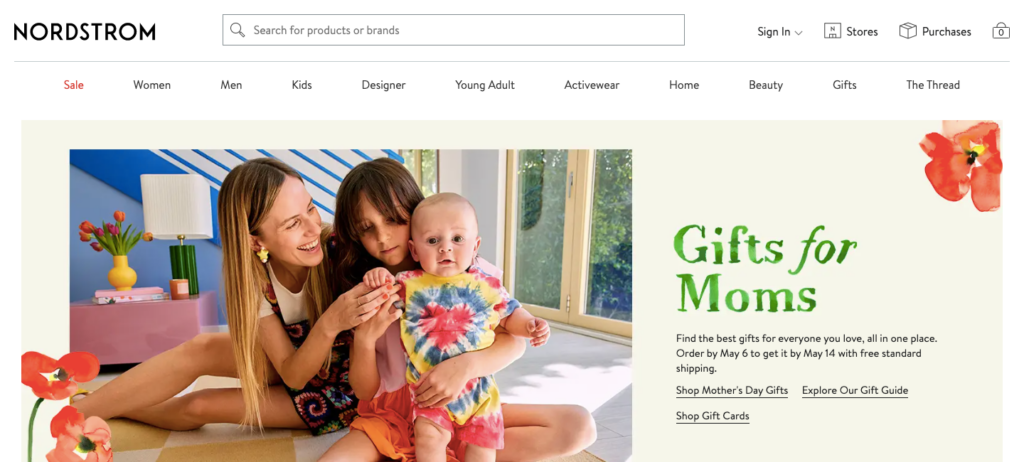
Figures from YouGov show that Nordstrom is one of America’s most popular department stores. It has a brand recognition rating of 92% and a higher popularity level than rivals like Neiman Marcus, Bloomingdale’s, and Saks.
The retailer sells a vast selection of brands and products across multiple price points, from affordable fashion to luxury names like Valentino. That makes it a good fit for any fashion-related affiliate marketer; if your audience is interested in clothes, shoes, and accessories, they’ll find something for them at Nordstrom.
That’s the good news. The less-good news is that Nordstrom’s affiliate program has a lousy 1% base commission rate. For comparison, Amazon pays 4% on apparel. Still, maybe the Nordstrom name carries a little more cachet for higher-end audiences.
- URL: Nordstrom affiliate program
- Managed by: Rakuten
- Commission rate: 1% per sale
- Cookie duration: 14 days
- Products/Services sold: Clothing, shoes, jewelry, accessories, homeware
- Payment methods: Direct deposit, PayPal, check
- Market(s): US only
- Additional resources: Creative banners, exclusive offers, affiliate marketing newsletters
What is Affiliate Marketing and How Does it Work for Bloggers?
Affiliate marketing is a strategy where bloggers and content creators earn commissions by promoting products and services to their audiences. It involves three key players:
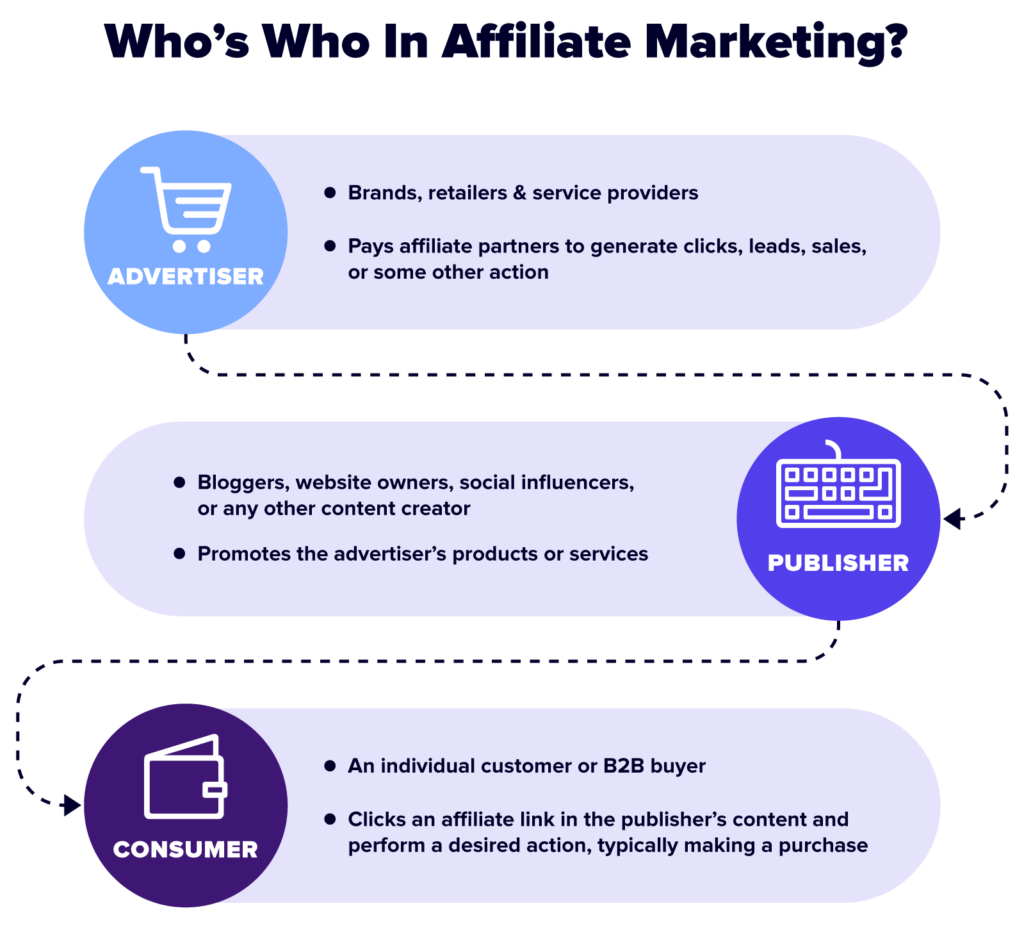
Now we’re clear on who’s involved, let’s consider what a typical affiliate marketing buyer journey might look like for an imaginary dog food review blog you’ve started:
- A consumer searches on Google for “best dog food for fussy eaters” and clicks on one of your posts.
- They read your recommendations and like the sound of The Farmer’s Dog, so they click your affiliate link through to the advertiser’s site.
- The Farmer’s Dog stores a tiny file called a cookie on the consumer’s device, identifying your blog as the referrer.
- Life gets in the way and the shopper ends their browsing session.
- The next day, they return to The Farmer’s Dog and purchase a subscription.
- Because they converted within the cookie window, you earn a commission for referring them. Way to go!
👉 Read also: How to Start a Review Blog
How Affiliate Marketing Works (a 5-Step Process)
Part of the reason affiliate programs for bloggers are so popular is because the barrier to entry is so low. Getting started basically involves these steps:
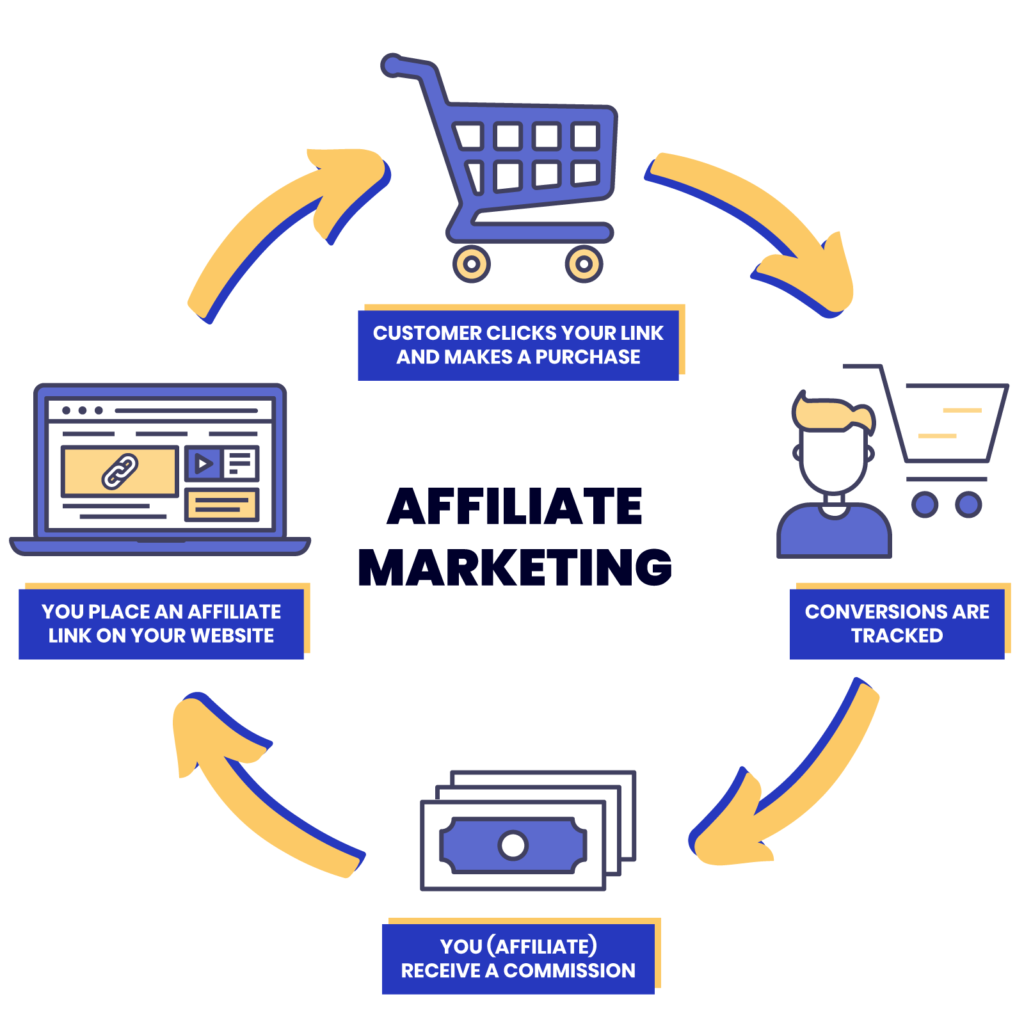
- Choosing a product: Identify a product or service that’s relevant to your audience, that they want to buy, and that they can afford.
- Joining a program: Find brands selling those products or services, then sign up for their affiliate programs on the advertiser’s website or through an affiliate network.
- Creating content: This part should be second-nature to all bloggers! Informational content (like how-to guides and explainer videos) helps you generate top-of-the-funnel traffic, while commercial content (like buying guides and product reviews) is your opportunity to promote specific products and add your affiliate links…
- Adding affiliate links: Use a unique URL containing your affiliate ID or username to direct the audience to the advertiser’s website.
- Earning commissions: This is the easy part, because it’s totally passive income! When a purchase is made via your link, the sale is traced back to you, and you receive a commission.
Find out more in our step-by-step guide on how to start affiliate marketing.
Why Websites are the Best Platform for Affiliate Marketing
Websites aren’t the only way to make money from affiliate marketing. There are lots of other options, including:
Social media: From Facebook to TikTok to Twitch, every social platform offers some way to add affiliate links. They often make it difficult though (e.g. you need a business account to add a link to your TikTok bio).
Email lists: Email marketing is unmatched when it comes to ROI. However, you need to leverage at least one other channel to encourage people to join your list in the first place.
Podcasts: Almost two in three US adults have listened to at least one podcast, so they’re a fantastic channel for reaching your audience. But because podcasting is an audio medium, you’ll have to stick your link in the show notes, where it’s easily missed.
So it’s totally possible to make money from affiliate marketing without a website; it’s just a lot more difficult.
Fact is, websites offer various advantages over other potential affiliate channels, such as:
Full ownership. With a website, you own all the content you create, ensuring its longevity. In contrast, third-party platforms could shut down, forcing content migration or loss. Just ask users of Posterous or Storify.
Control. Social media platforms can change their terms overnight, potentially damaging your affiliate business. However, a website allows you total control over your content and promotions.
SEO. Organic search targets high-intent traffic from users actively searching for information, like “best dog food for fussy eaters.” Ranking for such keywords increases the likelihood of commissions, while social media traffic is less qualified.
Dive into our post with 10 SEO Affiliate Marketing Tips.
Analytics. Google Analytics helps understand user behavior across platforms and create better content. Social media analytics are limited to single-platform insights.
Trust. Consumers trust blogs (65%) and websites (76%) more than social media (51%) for brand information. This increased trust in websites can lead to more clicks and sales from product recommendations.
👉 Check out our Beginner’s Guide on How To Build An Affiliate Marketing Website
For those reasons (and more), even affiliate publishers with big social followings — like ThisIsWhyImBroke, which has 277,000 Facebook followers — tend to steer audiences toward their own website rather than sending them straight to the advertiser:
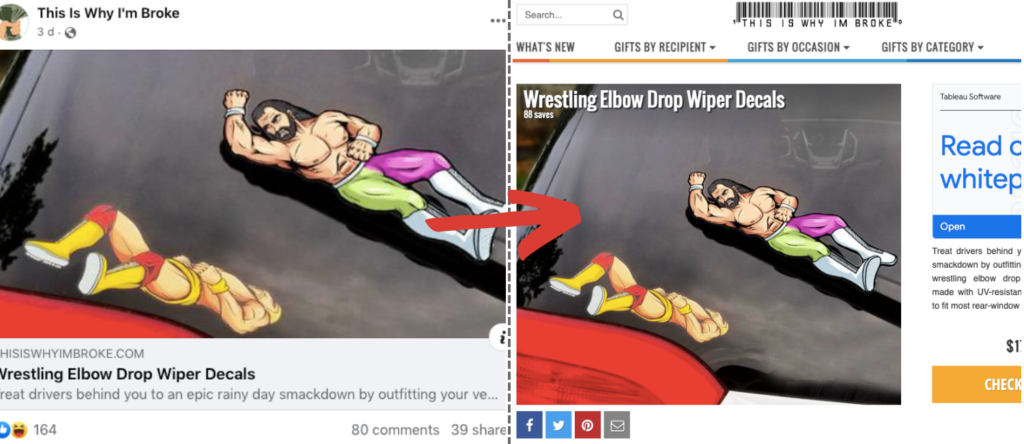
How to Choose the Best Affiliate Programs for Your Blog
There are two ways to choose affiliate programs: find them directly when you’re looking for a product or service to recommend to your readers, or sign up through an affiliate network to find multiple relevant advertisers on a single platform.
(Most) affiliate programs are run by a single brand, and allow you to promote only that brand’s products or services. Affiliate networks, on the other hand, might work with thousands of individual brands, making it quick and easy to find affiliate programs in your niche. However, you’ll often find more attractive terms and conditions — like higher commission rates and longer referral windows — by working directly with advertisers.
Here’s how both approaches work in practice:
1. Join Affiliate Programs Directly
Affiliate programs are run by advertisers (e.g. brands, retailers, and service providers).
You can find individual programs in your niche by simply Googling: {niche} + “affiliate program” (e.g. gaming + “affiliate program”).
That’ll likely bring up roundups of the best affiliate programs within that niche…

…as well as the occasional advertiser:

Alternatively, analyze other bloggers in your niche to see which programs they’re promoting, then join them yourself.
2. Sign Up Through An Affiliate Network
Joining an affiliate marketing network is a fast way to identify hundreds of programs at once.
These are exactly what they sound like: networks of multiple affiliate programs managed through a single platform, typically offering tools to help both publishers and advertisers generate a higher return from their affiliate marketing strategy.
Examples of affiliate networks include:
All offer search functions that make it easy to track down advertisers that align with your audience:
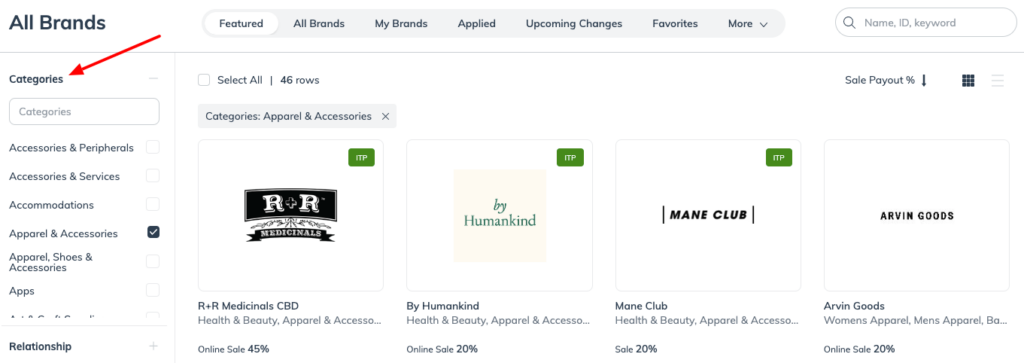
Factors to Consider When Choosing Affiliate Programs for Bloggers
New affiliate marketers often sign up for affiliate programs that are run by the biggest names in their niche or that pay the highest commissions, without first considering if those programs are a good fit.
Before joining a program, we recommend considering the following factors:
Relevance. In other words, would your audience buy products or services from this brand? And can you promote them naturally in your content without radically changing the direction of your blog?
Commission rate. Affiliate marketing is all about making money, so commission rates are kind of important. Rates typically range from around 5% — 50%, although lower (and higher) rates exist. Learn more in our roundup of high-paying affiliate programs.
Conversion rate. Not all affiliate programs or networks publish this information. But if you can find it, it’s an invaluable way to identify the best affiliate programs. Even if a program pays low commissions, you might still be an attractive option thanks to their sky-high conversion rate.
Cookie duration. Think of this as your window to seal the deal. For instance, if a program has a 30-day cookie duration, you’ll earn a commission if the customer buys within 30 days of clicking your affiliate link.
Payment method. Simply put, do their commission payment methods work for you? Not all advertisers pay via PayPal, so be sure to check this out.
Affiliate support. Most affiliate programs offer some support. But this might range from providing a couple banner ads to giving you access to a dedicated contact who’ll help optimize your affiliate marketing strategy.
👉 Check out our Best Affiliate Programs for Beginners
Conclusion
Affiliate marketing is one of the most attractive ways for bloggers to monetize their content.
It lets you build a passive revenue stream without forcing you to do anything that interrupts your audience (like bombarding them with ads).
As a blogger, you’ve got a head start on most would-be affiliate marketers, because you already have your own website and the ability to create content.
Still, there’s almost certainly room for improvement. And we’re here to help.
Sign up for our free training to learn seven tried-and-trust tips for building and optimizing a high-performing affiliate site.
See you there!
FAQ
How to start a blog for affiliate marketing?
Starting a blog for affiliate marketing is easy. Here are the steps to get your blog ready:
1. Choose a niche that you’re passionate about and that has a large audience.
2. Create a website using a platform like WordPress.
3. Sign up for affiliate programs that are relevant to your niche.
4. Create content that promotes the products or services you’re affiliated with.
How does affiliate marketing for bloggers work?
Affiliate marketing for bloggers works by allowing bloggers to earn commissions by promoting products or services on their websites. When someone clicks on an affiliate link on the blogger’s website and makes a purchase, the blogger earns a commission.
Do bloggers use affiliate programs?
Yes, many bloggers use affiliate programs as a way to monetize their websites. Affiliate programs allow bloggers to earn commissions by promoting products or services on their websites.
